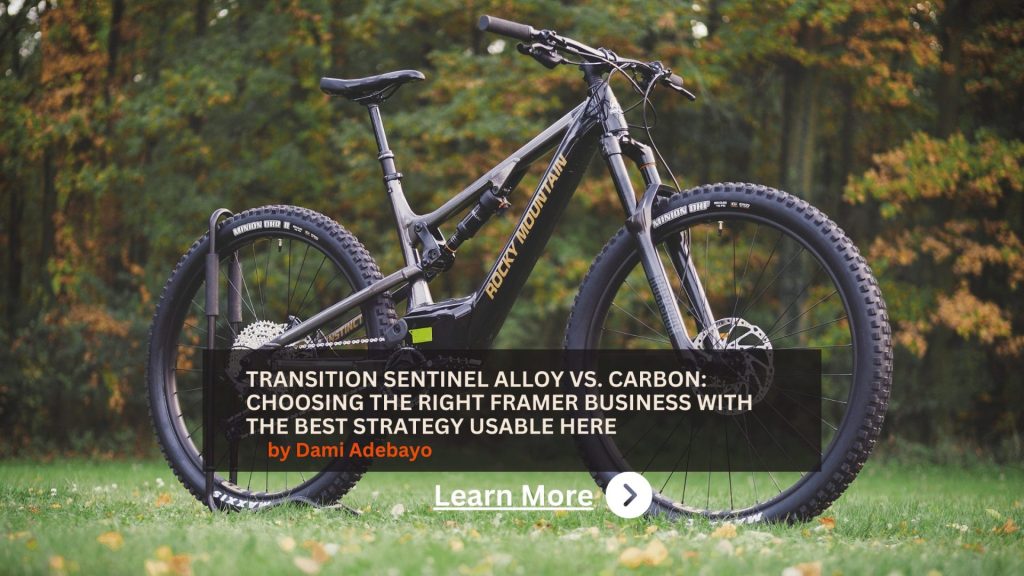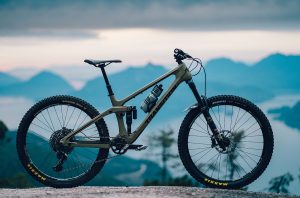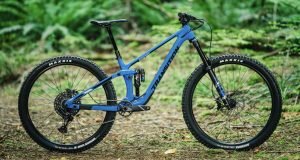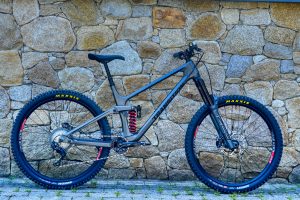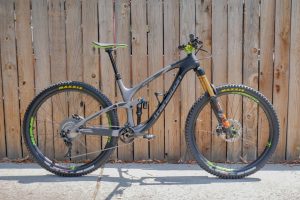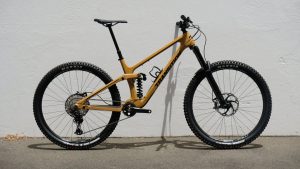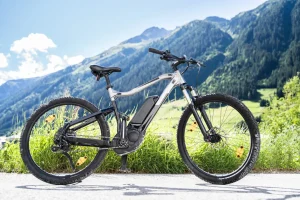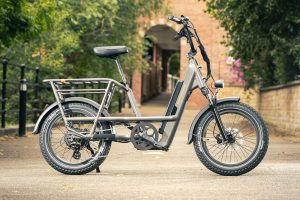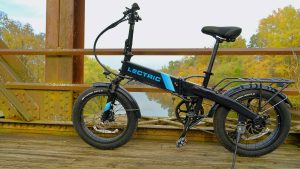When it comes to mountain biking, having the right frame is crucial for a great riding experience. Transition Bikes is a well-known brand that offers two popular options: the Transition Sentinel Alloy and the Transition Sentinel Carbon. Both frames have their unique advantages, and choosing the right one can greatly enhance your riding performance. In this article, we will compare the two frames to help you make an informed decision.

Understanding Transition Bikes
Transition Bikes is a reputable manufacturer known for producing high-quality mountain bikes. They are recognized for their commitment to designing bikes that excel in various riding conditions. The Transition Sentinel is one of their flagship models, and it comes in two different frame materials: alloy and carbon.
The Importance of Frame Material
The frame material plays a significant role in determining a bike’s characteristics and performance. It affects factors such as weight, stiffness, strength, and ride quality. Choosing the right frame material is essential to ensure that your bike meets your specific needs and preferences.
Transition Sentinel Alloy: Strength and Durability
The Transition Sentinel Alloy is a mountain bike frame made from aluminum or other alloy metals. It is known for its strength and durability, making it suitable for demanding riding conditions.
Strength: The alloy frame of the Transition Sentinel is designed to provide good strength. Aluminum alloys used in bike frames have high tensile strength, meaning they can withstand a significant amount of force or load without deforming or breaking. This makes the frame reliable and capable of handling rough trails, jumps, and drops. The strength of the alloy frame contributes to the overall stability and structural integrity of the bike.
Durability: The Sentinel Alloy frame is built to be durable, ensuring it can withstand the rigors of mountain biking. Aluminum is a robust material that offers excellent resistance to impacts and wear. It is less prone to scratches, dents, and corrosion compared to other materials. This durability allows the frame to endure harsh riding conditions and maintain its integrity over time, providing a long-lasting platform for your mountain biking adventures.
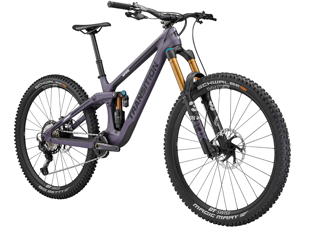
The Transition Sentinel Alloy frame combines strength and durability, making it a reliable choice for riders who seek a sturdy and resilient mountain bike frame. It can handle challenging terrains, provide stability during aggressive riding, and withstand the demands of off-road adventures.
Transition Sentinel Alloy Specifications
- Frame Material: Aluminum alloy
- Fork Travel: 160mm
- Rear Travel: 140mm
- Wheel Size: 29″
- Head Tube Angle: 64 degrees
- Seat Tube Angle: 76 degrees
- Chainstay Length: 433mm
- Bottom Bracket: Threaded
- Rear Dropout Spacing: Boost 148mm
- Brakes: Compatible with disc brakes
- Suspension Design: Horst Link
- Drivetrain Compatibility: 1x or 2x options
- Frame Sizes: Available in various sizes (S, M, L, XL)
Transition Sentinel Carbon: Lightweight and Performance
The Transition Sentinel Carbon is a mountain bike frame constructed using carbon fiber composite materials. It offers two key advantages: lightweight design and enhanced performance.
Lightweight: Carbon fiber is renowned for its exceptional strength-to-weight ratio. The use of carbon fiber in the construction of the Sentinel Carbon frame allows for a significant reduction in weight compared to alloy frames. This reduced weight translates to improved maneuverability, easier handling, and enhanced overall efficiency on the trails. A lighter frame also reduces rider fatigue, allowing for longer and more enjoyable rides.
Performance: The carbon fiber construction of the Sentinel Carbon frame contributes to its exceptional performance characteristics. Carbon fiber has inherent stiffness, which means it resists flexing or bending under load. This stiffness translates to efficient power transfer from the rider’s pedal strokes to the wheels, resulting in quicker acceleration and more responsive handling. Additionally, carbon fiber has excellent vibration damping properties, reducing road and trail feedback, and enhancing comfort during long rides.
The lightweight design and performance-oriented features of the Transition Sentinel Carbon make it an ideal choice for riders seeking a high-performance mountain bike frame. Its reduced weight allows for nimble handling, while the stiffness and vibration damping properties of carbon fiber contribute to enhanced power transfer and comfort. Whether tackling technical trails, climbing steep gradients, or descending with speed, the Sentinel Carbon delivers a responsive and exhilarating riding experience.
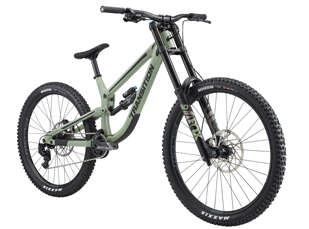
Transition Sentinel Carbon Specification
- Frame Material: Carbon fiber composite
- Fork Travel: 160mm
- Rear Travel: 140mm
- Wheel Size: 29″
- Head Tube Angle: 64 degrees
- Seat Tube Angle: 76 degrees
- Chainstay Length: 433mm
- Bottom Bracket: Threaded
- Rear Dropout Spacing: Boost 148mm
- Brakes: Compatible with disc brakes
- Suspension Design: Horst Link
- Drivetrain Compatibility: 1x or 2x options
- Frame Sizes: Available in various sizes (S, M, L, XL)
Comparing Alloy and Carbon Frames
Let’s delve into the specific aspects of alloy and carbon frames to better understand their differences:
| Aspect | Alloy Frame | Carbon Frame |
| Material | Made from aluminum or other alloy metals | Made from carbon fiber composite materials |
| Weight | Generally heavier than carbon frames | Generally lighter than alloy frames |
| Stiffness | Offers good stiffness and durability | Offers excellent stiffness and vibration damping |
| Strength | Provides good strength and impact resistance | Provides high strength-to-weight ratio |
| Comfort | Offers a relatively comfortable ride | Provides better vibration absorption for comfort |
| Flexibility | Less flexible compared to carbon frames | More flexible, allowing for smoother rides |
| Aerodynamics | Generally not as aerodynamic as carbon frames | Designed for improved aerodynamics |
| Customization | Allows for easier customization and repairs | Limited customization due to complex construction |
| Price | Generally more affordable than carbon frames | Usually more expensive than alloy frames |
| Maintenance | Requires regular maintenance to prevent corrosion | Low maintenance with high resistance to corrosion |
| Durability | Durable and can withstand rough riding conditions | Strong and resistant to impacts and wear |
Factors to Consider When Choosing a Frame
When selecting between the Transition Sentinel Alloy and Carbon frames, several factors should be taken into account:
- Riding Style: Determine whether you prefer aggressive trail riding, downhill, or a mix of various terrains.
- Terrain: Consider the types of trails you frequently ride, such as smooth singletracks or technical descents.
- Budget: Set a budget that aligns with your financial capabilities and the features you desire.
- Personal Preferences: Think about your riding preferences, including weight, stiffness, and ride feel.
Price Ranges
| Model | Transition Sentinel Alloy | Transition Sentinel Carbon |
| NX | $3,699 USD | $4,000 USD |
| GX | $4,799 USD | $5,000 USD |
| XT | $5,999 USD | $6,299 USD |
| GX AXS | $7,399 USD | $7,999 USD |
| Frameset | $1,999 USD | $3,299 USD |
As you can see, the alloy bikes are generally more affordable than the carbon bikes. The difference in price is due to the materials used in construction. Carbon fiber is lighter and stiffer than aluminum, but it is also more expensive.
If you are looking for a high-performance mountain bike, the carbon version of the Sentinel is a great option. However, if you are on a budget, the alloy version is a great value.
Conclusion
Choosing between the Transition Sentinel Alloy and Carbon frames ultimately depends on your specific needs and riding style. If you prioritize strength, durability, and a more forgiving ride, the alloy frame might be the better option. On the other hand, if you seek lightweight performance, superior stiffness, and vibration-damping properties, the carbon frame would be more suitable. Consider the factors discussed in this article and make an informed decision based on your preferences and budget.
Frequently Asked Questions (FAQs)
Q: Are Transition Sentinel frames available in different sizes?
A: Yes, Transition Bikes offers frame sizes to accommodate a range of rider heights.
Q: Can I upgrade the frame material in the future?
A: No, the frame material is intrinsic to the bike model and cannot be upgraded.
Q: Are alloy frames more affordable than carbon frames?
A: Generally, alloy frames are more budget-friendly compared to carbon frames.
Q: Do carbon frames require more maintenance?
A: Carbon frames require similar maintenance to alloy frames, but they may require additional care in case of damage.
Q: Which frame material is suitable for beginners?
A: Both alloy and carbon frames can be suitable for beginners, depending on their riding preferences and budget.
Final Thoughts and recommendations
In this article, we have explored the differences between the Transition Sentinel Alloy and Carbon frames. By understanding the characteristics and benefits of each frame material, you can make an educated decision that aligns with your riding style and preferences. Remember to consider factors such as weight, stiffness, strength, and ride quality when choosing the right frame for your mountain biking adventures.
